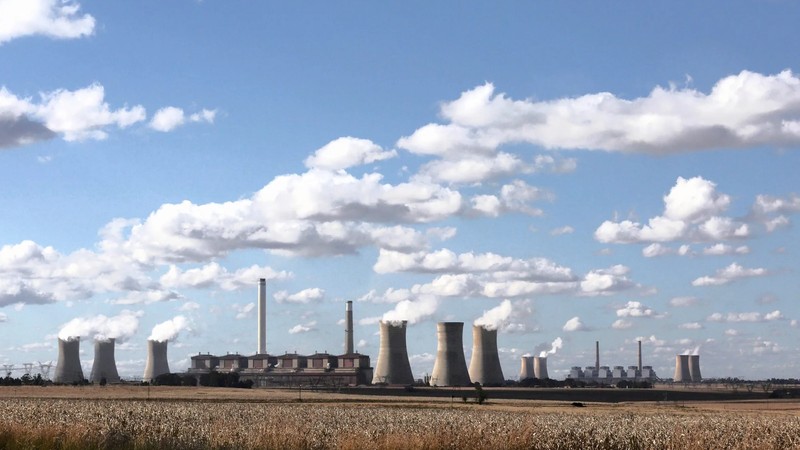The government has been called to listen to the people, as communities located near coal-fired power stations such as Sasolburg and Power Vaal face health challenges due to air pollution.
A new report conducted by NGOs Vaal Environmental Justice Alliance (VEJA) and Section 27, revealed that residents are experiencing serious health consequences due to poor air quality, while the government continues to ignore their call for action.
The report, titled Vaal Triangle Priority Area Health Impact Report 2025, revealed that more than 65% of participants experience headaches as a result of poor air quality.
The research was based on surveys conducted in Zamdela, Deneysville and Power Vaal, which is located near Lethabo Power Station.
Residents added that they also experience coughing, tiredness, shortness of breath and wheezing.
About 50 of the respondents stated that they had been experiencing symptoms for more than 5 years, which, according to the report, may not be surprising considering that 93% of them have been residing in the Vaal for more than 5 years.
However, 14% of the residents reported having no symptoms.
“These findings underscore the urgent need for systemic interventions, including enhanced communication, improved access to healthcare, and effective environmental regulation, to protect affected communities from the ongoing impact of air pollution,” read the report.
Asked if the department is aware of the situation, the Department of Mineral Resources and Energy spokesperson, Makhosonke Buthelezi, said the department has not seen the report and is unable to respond.
The Vaal Triangle was declared an Airshed Priority Area (VTAPA) due to high levels of pollutants in the area in 2006. This declaration was made in terms of the National Environmental Management: Air Quality Act (NEMAQA), 2004 (Act No. 39 of 2004). As part of a priority area declaration, NEMAQA requires the government to develop an Air Quality Management Plan (AQMP).
Following the declaration of the VTAPA, in 2010, the Vaal Triangle Airshed Priority Area Air Quality Management Plan (VTAPA-AQMP) was published in accordance with NEMAQA. To further address the issue of industrial pollution and other greenhouse gas emissions and to enhance the country’s adaptive capacity to address climate change impacts more fully, the South African government passed the Climate Change Act in 2019.
This Act aims to enhance the government’s efforts to respond to climate change resulting from greenhouse gas emissions in a uniform manner nationwide, particularly in areas such as the Vaal. It creates obligations on government departments to adopt mitigation and adaptation plans to deal with the consequences of climate change.
The report stated that despite these policy commitments and imperatives, the government still defended its plan to add 1,500 megawatts (MW) of new coal-fired electricity generation in a court case now widely known as #CancelCoal.
The report added that this is a decision that would inevitably lead to further pollution and contradict any planned response to climate change. The proceedings were brought by the African Climate Alliance, Vukani Environmental Justice Movement in Action, and GroundWork, with Section27 and VEJA joining as amicus curiae.
The Minister of Mineral Resources and Energy, the National Energy Regulator of South Africa (NERSA) and the Minister of Electricity are cited as respondents.
The North Gauteng High Court found that the government’s plans were unlawful and invalid as they failed to adequately consider the impact of new coal power on constitutional rights, particularly those of children.
VEJA and Section 27 said the government was in the process of taking the case on appeal at the time of printing the report.
The report also revealed that close to 90% of participants reported noticing bad smells and 64% reported seeing smoke, with around 50% reporting smog and less than 30% noticing thick air.
Despite the severity of the health and environmental challenges, the government’s response has been perceived as largely inadequate. An overwhelming 92.31% of respondents reported that no government action has been taken to address concerns about air quality.
The report stated that a significant majority of participants (83%) were aware that the Vaal is classified as a High Priority Area, which suggests that they have a foundational awareness of its environmental status, which could influence their perceptions of risk and the responses from the government.
The research also found that clinics often lack proper diagnostic machines, which could lead to misdiagnosis or an insufficient diagnosis.
As a result, community members are all diagnosed with the same illnesses and health facilities lack the same medicines.
“When respondents were asked about the types of barriers they face in accessing medicines, the majority (80%) reported that stock shortages at clinics and health facilities were a problem. Another 71% reported experiencing long waiting times, and 49% cited distances to facilities as a barrier they face. 37% reported the price of medicines as a barrier that they face in getting medication.”
The research also found that 40% of the respondents said their family members had been hospitalised due to poor air quality, “while 70% of those who reported yes had been hospitalised more than once.”
